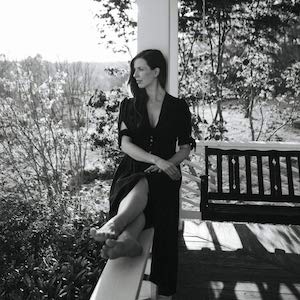 Joy Williams – Front Porch
Joy Williams – Front Porch
Sensibility/Thirty Tigers – 1 May 2019
There are many details to note about Joy Williams’ new solo album even before the first few notes of opening song ‘Canary’ have played out. After the demise of her duo, The Civil Wars in 2014 Joy called up Justin Timberlake to get the wheels in motion for what would become Venus, her debut solo effort, released in 2015. With synths and processed drums forming much of the structure of that album and the title itself being far from Earth and home, the aim of making an album removed from what she was doing before was a sound one and the result was a success. But now we have Front Porch, the very title bringing us back down to Earth and into a sonically modest world, produced by Kenneth Pattengale of The Milk Carton Kids, a band known for their stripped back acoustic approach.
The idea was to wrap the songs in instrumentation that is simple enough to be heard from the porch and intimate enough to be inviting to the listener, and it is immediately clear that the decision plays to Joy’s strengths. ‘Canary’ opens with Anthony Da Costa’s acoustic guitar playing a little dark line alongside a tapping foot soon joined by Williams, sounding like KT Tunstall during the Invisible Empire sessions. Before long, John Mailander’s violin and Russ Pahl’s pedal steel are heard blending into the mix, but the touches are soft and Joy’s voice always remains in the foreground, which is welcome, because the song is strong and her singing is reliably excellent. The title track is even better, with another minimal piece of acoustic guitar framing a gorgeous country weepie (‘if never you find what you’re looking for, come on back to the front porch’), with Pattengale’s nylon string picking coming in over the steel string nicely and the fiddle sweeping and amping up the emotion perfectly.
‘Warm’ is the word that often springs up when Williams talks about how she and Kenneth wanted Front Porch to sound and her disregard of any superfluous instrumentation padding out the songs really helps to focus the record and provide that warmth and intimacy. Just listen to the skeletal acoustic intro to ‘When Does a Heart Move On’, the less optimistic companion piece to the title track, with its straight up ‘I’ll leave the light on, but we both know you’re not coming home’ lyric. There is violin and pedal steel in the background, but it is barely there for the most part, haunting the tune like the departed lover and emphasising the starkness and vulnerability of Williams’ voice. It is a deliberately arranged piece, with the stilted guitar part mirroring the wavering nature of the vocal. Contrasting this are songs like ‘One and Only’, with Williams’ voice lifting to sing a dream-like summer love song. Here Pattengale’s nylon string plays into the mix again, with the softer strings and his backing vocals bringing a lighter mood to the song. The line up is just as spare, with bass and pedal steel accompanying the guitars, but the versatility of the musicians is apparent here and the shift in mood is finely realised.
A maverick track is ‘When Creation was Young’, a song with teeth that effectively showcases the range of Williams’ voice. This one belongs on a Deadwood style soundtrack, with dobro mixing with violin and pedal steel and the whole band stepping forward to attack the song, even being given room to have a mini hoe down midway through. The message is a simple one, but the telling of it touches on more serious and essential themes and the players obviously having a great time results in probably the most muscular song of the set and one that works well against the slower pieces.
But possibly the best piece of writing on Front Porch is ‘Preacher’s Daughter’, a seemingly autobiographical tribute to Williams’ own father, who passed between the making of Venus and this album. The writing has a definite traditional country taste, which Williams plays to in her singing of it, as does da Costa’s guitar part, which is patient and spacious, not unlike a Dave Rawlings composition. The lyrics are direct instead of abstract and all the more heartfelt for it, and the arrangement is at its most slender, with the acoustic guitar backed only by the softest of violin parts and subtle bass. It is a beautifully simple and effective piece that is one of the strongest on here, but ‘Hotel St. Cecilia’ certainly gives it a run. Here Pattengale’s dobro is more prominent, with its echoey nature working nicely with Williams’ close vocals. Following on from ‘Preacher’s Daughter’, this duo of tunes makes up a wonderful second half to the record that strives to outdo the first.
But what Front Porch ultimately achieves across all twelve tracks is the sense of almost a creative rebirth of Joy Williams and this is summed up nicely by the two-minute final track ‘Look How Far We’ve Come’. Coming after the romantic waltzing of ‘Be With You’, the closer is a stripped back duet between Williams and Anthony da Costa, with the latter’s guitar the only instrument featuring. The result is an uplifting little song played in the old style that fully encapsulates the feeling behind this project. Because Front Porch is a wonderfully conceived and unselfconscious piece of work that is heartfelt and honest and it is reflected in the arrangements, which are unfussy throughout, a pretty crucial decision that highlights the confidence running through it. The songs are beautifully written, again with little fuss or unnecessary flourishes and the playing and production is spot on throughout. Joy Williams has really hit her stride with this one, Front Porch is an unassuming beauty.
Front Porch is out now.

